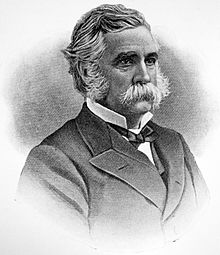John W. Davis (governor)
| John W. Davis | |
|---|---|
 |
|
| 38th & 41st Governor of Rhode Island | |
|
In office May 27, 1890 – May 26, 1891 |
|
| Lieutenant | William T. C. Wardwell |
| Preceded by | Herbert W. Ladd |
| Succeeded by | Herbert W. Ladd |
|
In office May 29, 1887 – May 29, 1888 |
|
| Lieutenant | Samuel R. Honey |
| Preceded by | George P. Wetmore |
| Succeeded by | Royal C. Taft |
| Member of the Rhode Island House of Representatives | |
|
In office 1885–1886 |
|
| Personal details | |
| Born |
John William Davis March 7, 1826 Rehoboth, Massachusetts, USA |
| Died | January 25, 1907 (aged 80) Pawtucket, Rhode Island |
| Resting place | Riverside Cemetery |
| Nationality | American |
| Political party | Democratic |
| Spouse(s) | Lydia W. Kenyon, Emily P. Goffe |
| Occupation | Mason, teacher |
| Military service | |
| Allegiance | United States of America |
| Service/branch | National Guard |
| Years of service | 1861–1865 |
| Unit | Rhode Island National Guard |
| Battles/wars | American Civil War |
John William Davis (March 7, 1826 – January 25, 1907) was a United States Democratic politician, who served as the 38th and 41st Governor of Rhode Island (1887–1888 and 1890–1891).
John W. Davis was born at his family's farm house in Rehoboth, Massachusetts on March 7, 1826. He attended public schools in Rehoboth and a private school in Pawtucket, Rhode Island. Before entering politics, he was engaged in various occupations; in 1844 he moved to Providence to become apprenticed as a mason. He also received his certification as a schoolteacher, and for several years traveled through the southern states to work in both professions. Davis then started in partnership with his brother a grain and provisions business on South Water Street in Providence, which operated from 1850 to 1890.
During the American Civil War, he served in the Rhode Island Militia, first as a member of an infantry unit, and later in a local unit known as the Providence Horse Guards.
His first experience in politics was as a member of the Democratic City Committee of Providence in 1854.
Davis moved to Pawtucket, Rhode Island in 1877 to serve as the resident manager of Riverside Cemetery. He lived on the cemetery grounds in a wooden octagonal gatehouse. Davis served in a number of local offices in Pawtucket. In 1882 and 1885 he served on the Town Council. He served as a State Senator in 1885 and 1886.
In 1886, Davis was appointed by fellow Democratic President Grover Cleveland as an Appraiser of Foreign Merchandise for the Providence U.S. Customs District.
Davis served two nonconsecutive one-year terms as governor. He was the first Democratic governor since the 1850s and the first Pawtucket resident in the State House since Joseph Jenckes, Jr. in the 1730s. His progressive administration was known for giving foreign-born residents the same voting rights as native-born citizens, expanding suffrage to women, establishing the boundary line between Rhode Island and Connecticut, and reforming election laws and orphanages.
...
Wikipedia
